Dentures Frisco
Conservative, Reliable Tooth Replacement

Dentures are a common option used to restore teeth. Along with other benefits, many find their cost much more affordable than dental implants, for instance. They also don’t require surgery or an invasive procedure. A removable set can provide you with a functional, great-fitting, and natural-looking dental replacement. You may have lots of questions or concerns about getting a partial or full set of prosthetics, and we are glad to address those here and in the office. Dr. Gadhiya is here to discuss your options, so call and schedule an appointment with us today.
Why Choose Highland Oak Dental for Dentures?
- Dentist Uses Only the Highest-Quality Materials
- We Welcome Your Dental Insurance & Maximize Your Benefits
- Personalized Prosthetics Crafted Using Enhanced Impressions
Full Dentures
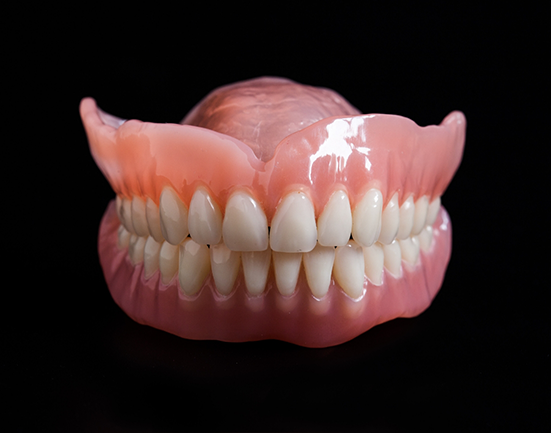
A full denture is a removable prosthesis that is used to replace an entire set of missing teeth on your upper or lower jaw. Our dentist will remove any remaining ones, if any, and will fit the patient for the fixture. Our complete set is designed to feel natural and comfortable, require as few dietary restrictions as possible, decrease the chance of bone loss in your jaw and mouth, and look great.
Full dentures are either “conventional” or “immediate.” They are made after the teeth have been removed, and the tissue has started to heal. Conventional types are ready in about eight to twelve weeks after the teeth are removed, and immediate dentures are crafted in advance, only to be positioned once the extraction is complete. The wearer does not have to be without teeth during the healing period.
Full Denture Preparation
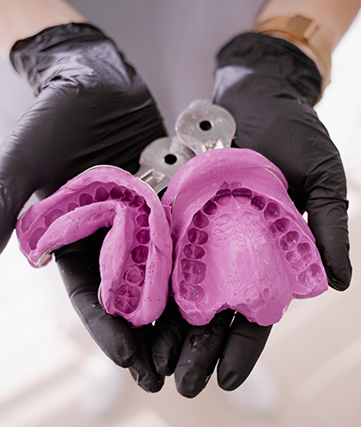
Preparing for the process requires the specialist to remove any existing teeth. Before the extraction, impressions are taken to be sent to the lab, accompanied by color specifications. Once they are received from the lab, the patient will try them on so that any adjustments can be made to ensure a perfect fit.
Full Denture Aftercare
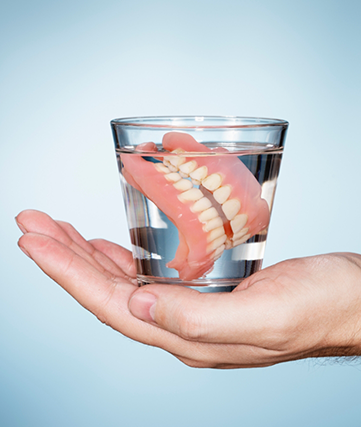
While not overly difficult, it is still extremely important that you properly care for your new dentures. Since these artificial teeth are removable, they should always be taken out for cleaning after eating before being reinserted in the mouth. They should be stored separately in water or a special solution during the night. Failure to do so could cause the denture to dry up and even warp.
When this happens, it makes them ill-fitting and painful to wear. As they don’t have roots, as implants do, the bone around the empty tooth sockets is likely to dissolve. This process is known as resorption and causes the gums to shrink, resulting in the piece needing a relining to ensure a proper fit. If taken care of properly, full dentures can last for approximately seven years.
Are There Limitations to Dentures?
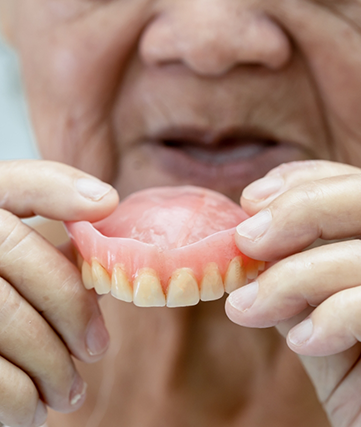
With dentures, you can expect a few drawbacks, namely the need to have them relined to prevent a loose fit. Also, although they are made from durable materials and should not fall out, occasionally, due to an improper bite or damage to the device, a tooth could loosen and fall out or need to be repaired.
One of the biggest challenges that comes with missing teeth is gum shrinkage. When tooth loss occurs, the gums will begin to shrink, sometimes up to 50%. This can be problematic when you are wearing dentures. As you continue to wear them, you’ll find that they may not fit as well as they did before. Not only will the adhesive no longer be as effective, but they will slip when you talk or chew, and sometimes, your dentures will completely fall out of your mouth. When this happens, visit your specialist and have them relined. Furthermore, you should also keep in mind that excessive usage of denture adhesives will lead to zinc toxicity.
Is Tooth Extraction Necessary for Dentures?
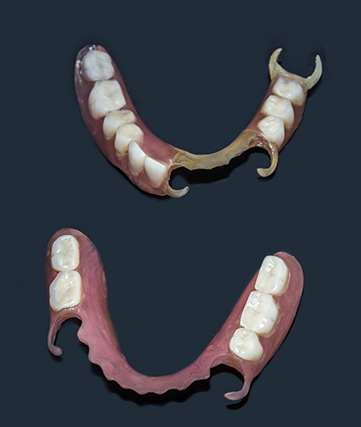
It is rather common for patients to hate the overall idea of having their teeth pulled. In reality, you can have dentures without extracting healthy ones. This is something to discuss with your dentist beforehand, as it may be necessary for your remaining, natural teeth to undergo root canal treatment to prevent any potential infections or inflammation.
Denture Snap-Ons & Fixed Dental Implants
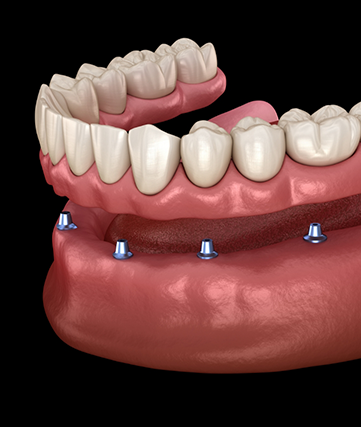
Full dentures that are supported by implants are commonly referred to as All-on-4. These are the closest that one can get to having natural teeth. Instead of having fixed implant dentures, you can choose to have a denture that comes with snaps and allows you to remove them and insert them as you wish.
A one-piece denture without a roof plate is popularly referred to as a “snap-on denture.” They consist of a complete set of artificial teeth with a removable base that can be snapped onto four or five different implants. This is suitable for anyone missing all of their natural teeth but who still has sufficient bone to support the implants. We will go over each treatment to help you understand the kind of options best suited to your needs.
How Much Do Complete Dentures Cost?

The price for full dentures is estimated to be between $2,000 and $20,000 per arch. This will depend on the kind of material used as well as if the dentures are customized. An affordable price for a complete upper – lower teeth set ranges from $600 to $1,200, while a mid-range complete denture normally costs about $1,000 – $3,000 per arch. On the other hand, premium complete dentures cost approximately $4,000 to $8,000 per arch. If you have a dental insurance plan, it may help reduce your total expenses.
Partial Dentures

A partial is made from a gum-colored base that matches your gums, and artificial replacements may be connected by a metal frame. It is designed to replace one or more missing teeth, keeping the existing ones from moving into gaps along the arch. Partials are beneficial because not only do they fill the space created by the missing teeth but also prevent neighboring ones from shifting into position.
Partial Dentures VS Full Dentures
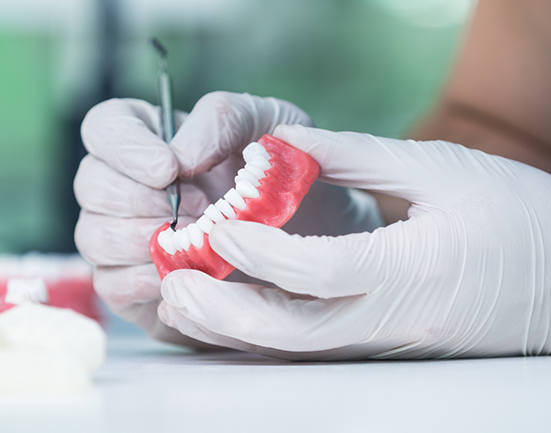
Partials, along with full dentures, satisfy different requirements. When only a certain number of them must be replaced, the benefits of one outweigh those of the other. The following are the main differences:
- If a patient has lost almost all their teeth, complete dentures have to be used. Partial sets, on the other hand, are going to replace between 1 and 3 missing teeth in a row in the jaw.
- Partial dentures feature the benefit of keeping the natural ones in place, and only the missing teeth are substituted. Full sets require empty arches with any remaining teeth being removed beforehand.
- They can be fixed or removable. The fixed sets are otherwise called bridges. There are also implant bridges, and they are called such because they are supported by titanium posts that are surgically placed within the jawbone.
- Partial sets are less expensive than the complete versions.
- Retention of semi-prosthetics, as well as their stability, is significantly higher compared to their traditional counterparts as they obtain support from the adjoining natural teeth, the oral soft tissues, and the jawbone. However, retention for the traditional set depends on the soft tissues and the underlying bone alone.
Overdentures
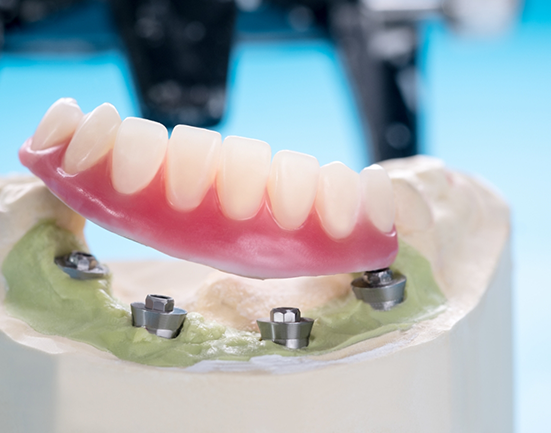
Overdentures are detachable partial or full sets of dentures that are put over remaining teeth or implants. They are more durable and long-lasting thanks to the support that exists underneath the prosthetics. Not only do they enhance the look of a patient’s teeth but also lessen the chances of the jawbone becoming smaller.
No matter which type of denture you receive, prosthetic adhesives are needed to ensure new teeth do not slip or fall out. However, keep in mind that using denture adhesives in excess may result in zinc toxicity.
How Much Do Dentures Cost?

The cost of dentures is different for each person, as every case is different. There are varying price ranges that you can review to better understand what you might expect; however, only until you meet with our team will we be able to provide a more personalized estimate for you. The following averages are as follows:
- A complete upper – lower teeth set ranges from $600 to $1,200
- A mid-range denture normally costs about $1,000 – $3,000 per arch
- Premium dentures cost approximately $4,000 to $8,000 per arch
It’s recommended that you use your dental insurance if you have it, as this will help lower your out-of-pocket expenses.
Denture FAQs
How long do you have to wait to get removable dentures after teeth are pulled?
After an extraction, the duration of the healing period usually takes around 6 to 8 weeks. You will have to wait for the gum tissues to completely recover if you want to achieve a better denture fit.
Can I get my teeth pulled and get dentures on the same day?
Yes, immediate dentures are possible. Teeth impressions are usually created at least one month before the extraction. Patients do not need to worry about missing teeth while healing after extraction because dentures are immediately placed on the same day. Nevertheless, necessary relining or readjustments are performed when the gums and jawbone recover.
Do they put you to sleep when you get dentures?
Extracting all the remaining teeth before having dentures is required. Thus, local anesthesia or IV sedation is usually administered before the actual removal so that you’ll be pain-free. You might feel a bit of discomfort during the healing period, but it will eventually disappear. Dr. Prakash Gadhiya will make sure that you’re comfortable during the procedure.








